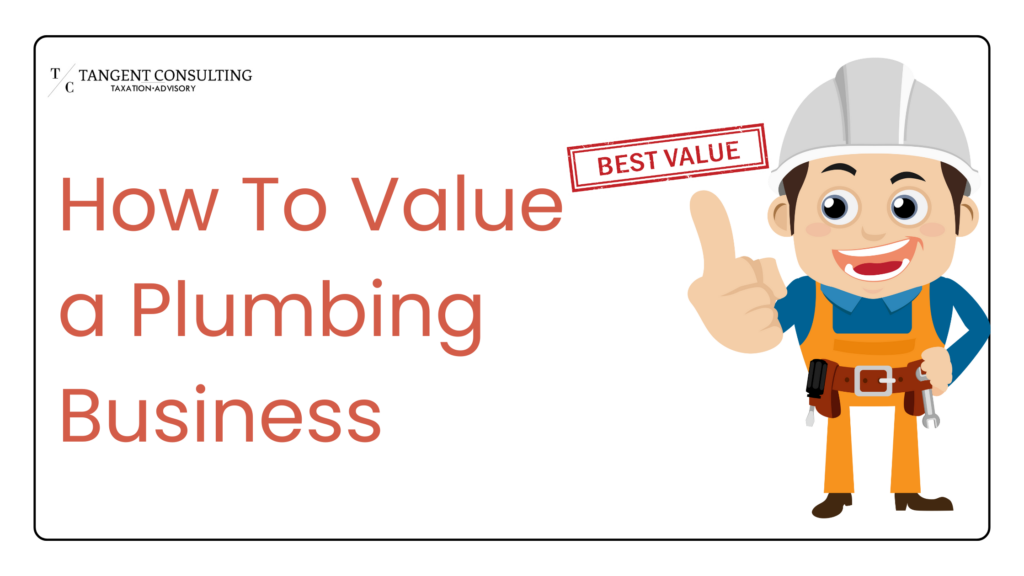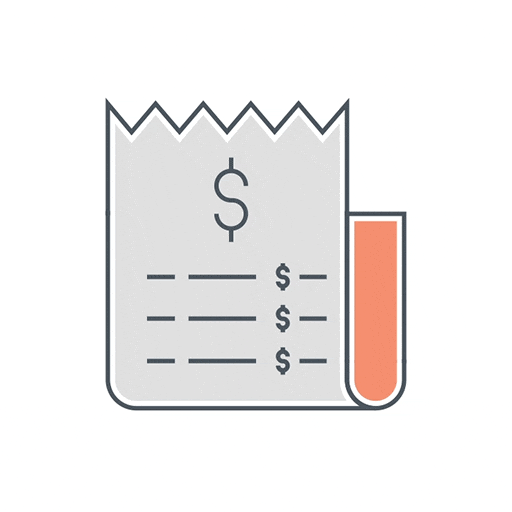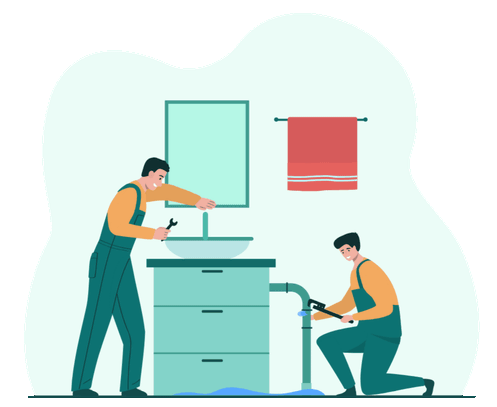How To Value a Plumbing Business? It’s Easier Than You Think

How To Value a Plumbing Business? It’s Easier Than You Think

During our teenage years, we tried to assemble IKEA furniture without instructions. Dad was skeptical and bet we couldn’t do it, and he was right!
Halfway through assembling, we looked and saw an unusual piece of furniture that was good for nothing. The story we told reveals two things:
A. Don’t bet against dad.
B. Certain things can be complicated but don’t have to be.
When we talk to different plumbing businesses, we like to tell this story, as they think valuing a plumbing business is complicated. However, it isn’t, as we are about to reveal how to value a plumbing business without breaking a sweat.
So, if you are looking to value your plumbing business, stick with us for the next 10-15 minutes.

How to Value a Plumbing Business?
The plumbing industry has grown at a CAGR of 2.3% in the US for the past five years, and it is estimated that the industry can continue to expand. The stats show the importance of business valuation so that your business doesn’t fall behind and can appeal to potential buyers.
The problem is that many plumbing business owners think business valuation is difficult. However, valuing a plumbing business is much easier than unclogging a drainpipe. So, let’s break down the key components so you can value your business properly.
Earnings Multiplier
The earning multiplier is how many stock analysts determine the value of the business, and by using it, you can also determine the value of your business.
The earning multiplier is applied to your business’s earnings to estimate its value. This multiplier is based on several factors, such as the size of your business, profitability, and income forecast.
Now, to the geeky stuff!
To determine the earning multiplier, you need to find out your business’ earnings. Here’s how you can do that:
- For small plumbing businesses earning less than $1 million annually, SDE (Seller’s Discretionary Earnings) is used. SDE represents the total financial benefit the owner derives, including salary, perks, and profits.
- For larger plumbing businesses earning more than $1 million annually, the focus shifts to EBITDA (Earnings Before Interest, Taxes, Depreciation, and Amortization). EBITDA measures a company’s ability to generate sustainable profits and is a preferred metric for larger enterprises.
A key point to add here is recurring revenue can boost your earnings multiplier. Unlike one-off projects, recurring revenue provides a steady, predictable cash flow. This stability makes your plumbing business more attractive and less risky, increasing its multiplier.
For instance, let’s compare two hypothetical plumbing companies:
- Plumbing Company A relies solely on one-time jobs like emergency repairs or new installations.
- Plumbing Company B has multiple long-term service contracts with property managers and businesses.
Company B would command a higher multiplier despite having similar total earnings because of its predictable income stream. Predictability equals stability, and stability equals value.

Book Value
Book value is another important factor to consider when valuing your plumbing business. Book value represents your business’s net worth based on its tangible assets and liabilities.
This approach is especially useful for understanding the baseline value of your business, regardless of its earnings or future potential.
For instance, a plumbing company with modern equipment, minimum liabilities, and a good inventory system will likely have a stronger book value.
The formula for book value is
Book Value = Total Assets – Total Liabilities
- Total Assets include everything your plumbing business owns, such as equipment, vehicles, tools, inventory, and even reserved cash.
- Total Liabilities cover what the business owes, such as loans, unpaid bills, or other financial obligations.
For example, if your plumbing business owns $500,000 worth of assets and has $200,000 in liabilities, the book value would be:
$500,000 – $200,000 = $300,000
Why Book Value Matters?
The book value acts as a safety net for potential buyers of your business. It shows the minimum value they can expect if they sell all the business’s assets and pay off its debts.
However, book value doesn’t account for intangible assets like brand reputation, customer relationships, or recurring revenue streams.

Market Value
Also known as the market approach or comparative approach, this method involves evaluating your business based on publicly available data from similar plumbing businesses.
When you compare other plumbing businesses similar to yours, you can estimate a fair market value for your company.
How Does the Market Value Method Work?
The market value is calculated by analyzing data from recent plumbing business sales. It includes:
- Annual revenue
- Geographic location
- Size of the business (e.g., number of employees or service areas)
- Customer base and recurring revenue
By using this data, you can arrive at a value range that reflects what buyers are willing to pay for a business like yours.
For instance,
- Business A was recently sold for $500,000. It had an annual revenue of $900,000, five employees, and a strong reputation.
- Your business has a similar revenue but operates with six employees and caters to different areas. Your market value might be slightly higher at $520,000.
So, you see, the market value method gives you a real-world perspective on what buyers are willing to pay. However, it also has its limitations:
- If there’s a lack of comparable data in your market, it can be challenging to determine an accurate value.
- Unique aspects of business, like specialized services or brand reputation, may not always be reflected.

What Impacts the Value of a Plumbing Business?
We learned in business school that no two companies are the same. Each business has a unique aspect, and some factors can increase or decrease its value.
For instance, a business with consistent recurring revenue from maintenance contracts will be valued differently from one that relies solely on part-time repair jobs. Similarly, factors like customer base and even reputation play a role.
So, let’s see what impacts the value of your business.
Recurring Revenue
We touched on recurring revenue earlier as well, and we are mentioning it here also because it is one of the most significant factors that can impact the value of your plumbing business.
Unlike one-off jobs, recurring revenue provides a predictable and steady cash flow. This consistency makes your business a more attractive investment, as it reduces risk and ensures future income.
Why Recurring Revenue Matters?
Recurring revenue, such as long-term service contracts with property managers or businesses, serves as the backbone of financial stability. It reflects the strength of your customer relationships and the reliability of your services. For example, a plumbing company with 15 maintenance contracts generating monthly income will likely be valued higher than one relying solely on seasonal demand.

Customers
Your customers’ size, diversity, and loyalty can significantly impact how buyers perceive your business. After all, people trust you to solve their problems, and you need to provide them with great services so they can become recurring customers.
Why Customers Matter in Valuation?
The strength of your customer relationships directly influences your business’s stability and growth potential. Buyers would want an insight into your customer retention rates, the type of clients you serve, and how much of your revenue comes from repeat business versus new customers.
The key metrics to look for are:
- Customer Retention Rates: High retention rates indicate satisfied clients, providing a steady revenue stream.
- Customer Diversity: A diverse customer base reduces risk. Relying heavily on one or two large clients can be a red flag for buyers.
- Lifetime Value (LTV): The average revenue you generate from a single customer over their relationship with your business.
Pro Tip: Build long-term relationships through service contracts or membership plans.

Repute
A strong reputation in your local community or industry can significantly enhance the value of your business. Even if you aren’t selling your business, you have to have a good brand repute.
Why Reputation Matters?
A solid reputation establishes trust, which translates to customer loyalty and referrals. When a plumbing business is known for reliability, quality work, and excellent customer service, it becomes more attractive to potential buyers. A stellar reputation often means less effort for the buyer to retain clients or generate new business after the acquisition.
Factors That Influence Reputation
- Customer Reviews and Ratings: High ratings on platforms like Google, Yelp, or Angie’s List can boost your business value.
- Word-of-Mouth Referrals: A business that is strong on referrals indicates satisfied customers.
- Brand Recognition: A recognizable name, logo, or slogan associated with trust and quality adds intangible value.
Skilled Workers
Your workforce’s expertise, reliability, and loyalty heavily influences your business’s value. Any potential business buyer knows retaining an experienced team can give them less headaches.
Why Skilled Workers Matter?
A well-trained team ensures consistent quality and customer satisfaction and reduces the buyer’s risk of operational disruptions.
The key workforce metrics that can impact valuation are:
- Experience Levels: A team of licensed, experienced plumbers adds credibility and value to your business.
- Retention Rates: Low employee turnover reflects a stable work environment and reduces hiring and training costs.
- Specialized Skills: Workers with expertise in commercial plumbing, HVAC integration, or advanced diagnostic tools can enhance your business’s appeal.

Use of Tech
The plumbing industry is experiencing significant changes, helped by technology. Therefore, a tech-savvy business illustrates efficiency and scalability.
Why Technology Matters?
The plumbing industry may be rooted in hands-on work, but advanced technology can automate some operations, improve customer service, and boost overall profitability.
For instance, plumbing-specific software like Jobber or ServiceTitan can simplify scheduling, invoicing, and customer management, reducing administrative overhead. You can learn more about the two tools in our detailed comparison here.
Final Thoughts
So, there you have it! Each of the factors we mentioned above plays a key role in determining your business’s worth. The next time you consider valuing your plumbing business, take a step back and consider the bigger picture.
Speaking of the bigger picture, if you don’t understand the valuation methods, you can always get help from an expert, and Tangent Consulting is just the partner you need.
We have years of experience as a CFO, business coach, and tax consultant for plumbing businesses. With us, you don’t need to hire an accountant or business coach separately; you can get both in one place.
PS If you are reading this, it means you can have access to our free consultation for your plumbing business. Avail this for free today before we change our mind 😉
FAQs
What is a good profit margin for a plumbing business?
Generally, a 10% to 15% profit margin is considered good for the plumbing business. However, it depends on location and revenue streams.
What are plumbing service businesses’ expenses?
Common expenses for any plumbing business include labor costs, equipment and tools, vehicle maintenance, fuel, insurance, marketing, and software subscriptions.
What type of plumbing makes the most money?
Commercial plumbing and specialized services like gas line installation, pipe fitting, and high-end custom installations typically generate the highest income.
